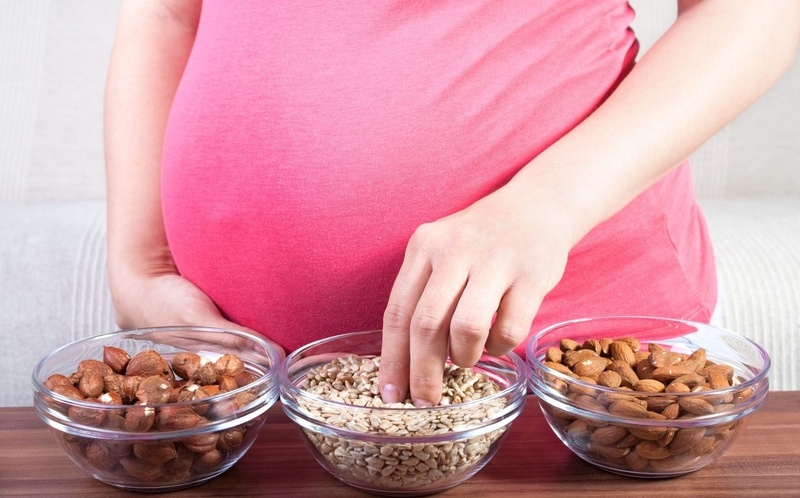Nutrition for Healthy Pregnancy

There is common saying that the pregnant woman should eat for two. But it is dangerous to eat double the quantity, but it is important to eat food twice as healthy.
It is recommended that an expecting mother should have a daily calorie intake of about 300 calories, depending on the pre-pregnancy weight and health condition etc. The protein intake during this phase should be 22 g more than the normal intake. This will help expectant mothers maintain a healthy weight while nourishing the needs of their growing fetus. A healthy Indian diet plan should include foods like dals, nuts, legumes, dairy products, fresh fruits, vegetables, meat, fish, eggs, water, and healthy unsaturated fats. You should consult your doctor or certified nutritionist to discuss your diet that suits your individual needs. At every meal, fill half your plate fruits and vegetables. Eggs are a great source of protein, make it a crucial part of your pregnancy diet.
Ensure adequate hydration during pregnancy. You should consume at least 10 to 12 glasses of water. This is required to maintain the protective amniotic fluid around the fetus to regulate your body temperature and prevent constipation which is commonly experienced during pregnancy. Avoid beverages as caffeine, soft drinks and alcohol as it could impact your baby mental and physical development.
Avoid consuming raw foods such as sprouts, raw eggs, fish during this time. Do not consume unprocessed milk or dairy products, it is always good to use pasteurized milk or milk products. Fruits, vegetables should be thoroughly washed before use. Also avoid uncooked or undercooked vegetables, fish, meat, street foods as far as possible as they provide a congenial environment for bacterial growth and can lead to stomach upset or infection. Junk foods should be avoided as they contain preservatives, added sugar, unhealthy fats and high sodium content affecting the overall fetus development.
A short list of healthy Indian foods recommended during pregnancy are:
- Milk and Milk Products: Dairy products as milk, buttermilk, Paneer (cottage cheese) are a healthy choice for the expectant mother as these are rich in calcium, protein, minerals and vitamin B12 and are excellent choice for growth and development of the fetus as well for mother’s health. Ghee is also excellent, although, saturated fat, you should limit it to measured amounts only -up to 2 teaspoons a day.
- Pulses and Cereals: Dals and other cereals are essential part of the pregnant woman’s diet. These are rich in protein and are a very healthy option especially for vegetarians. Include generous servings of dals, cooked sprouts, nuts, whole grains, millets and pulses in your daily diet, to give your body a protein boost. Millets such as ragi is a true nutritional gold mine, containing a rich amount of protein, vitamins, minerals, calcium, iron, natural fats, and so on, that can be incorporated into your diet in form of ragi malt, pudding, dosa etc.
- Fresh fruits and vegetables: Include fresh fruits and vegetables as this will provide the necessary nutritional requirement of fibres, vitamins, minerals and antitoxidants required for fetus and mother’s wellbeing. Include green leafy vegetables , avocados, beans. Beans are also a great food for fiber, which can help prevent and relieve two common pregnancy discomforts: constipation and hemorrhoids.
- Non-vegetarian foods: Fish and meat provide essential protein and promotes growth of hormones that are required to regulate various processes in the body. Fish contain vital nutrients including omega-3 fatty acids, protein, vitamins, and iron. These nutrients are essential, particularly for pregnant mothers, as they foster healthy fetal, infant, and childhood development. You can include in your diet Butterfish (Pomfret), Hlisa, indian mackerals, Indian salmon (Rawas) etc. However avoid large, predatory fish and fish rich in mercury as shark, sword fish, etc. Ensure that all meats and poultry are fully cooked before eating. Avoid consuming red meat in excess can lead to gestational diabetes (diabetes during pregnancy).
- Also include healthy unsaturated fats like peanuts, different types of seeds like flaxseeds, watermelon, pumpkin seeds, almonds, walnuts, as they are important for development of fetal brain, nervous system and eyes and contribute to expectant mother’s health reducing risk of diabetes, cardiac and kidney disease. And last but not the least make a habit to eat early and light at night as this will help improve your metabolism and make you feel light and healthy. Homemade food is Ultimately the best and healthy choice.